The Essential Elasticity of Loneliness
Walking the Solitary Distance Between Duty and Surrender
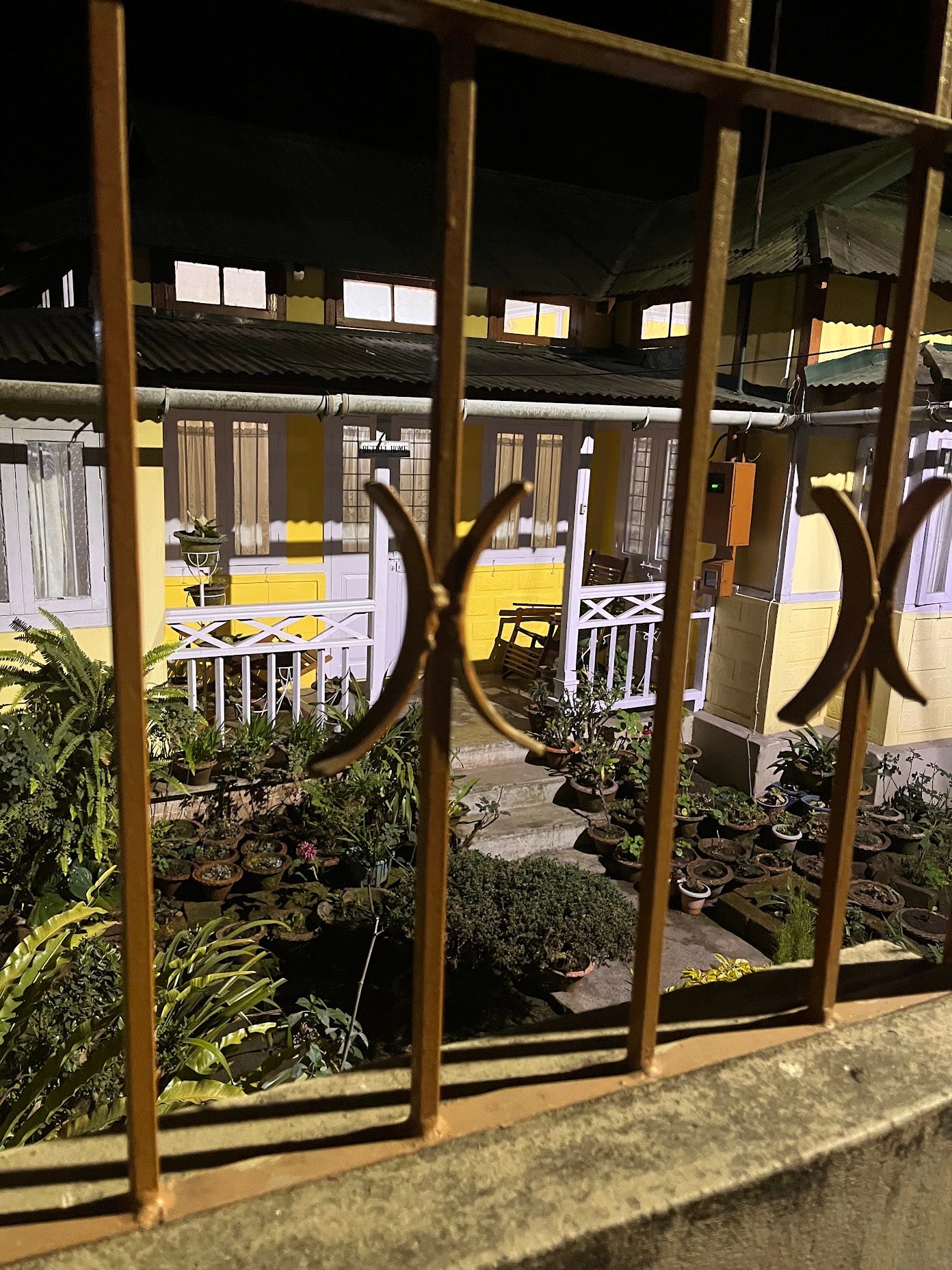
“These are the times in life — when nothing happens —
but in quietness the soul expands,”
wrote Rockwell Kent, as he lived in solitude along the shores of Alaska, contemplating what it means to be an unconventional artist, all while steeped in the spirit of Henry David Thoreau’s writings.
Namaste Friends,
As the screeching brightness of the day blazes through the subcontinent, the nights acquiesce to the quiet multitudes of early monsoon showers. I have been sleeping in intervals, my mind restlessly wandering from one vivid dream to another. I am in a season of life that pulls me relentlessly into activity, only to leave me hollow. I bemoan the dreariness of constant happening, yet there is a sense of an obsidian-sharp awakening in this clench of unease. I crave solitude in its inspired commune with nature, only to find myself in the isolated inlands of loneliness where spirit mires in dread, and hope seems to be in constant conflict with survival.
I have been investigating loneliness. Not the philosophical wrestling, but the direct experiential nuance of its blatant force and sharp aches. I have let myself sink into the bottomless pit of the biggest pitcher where loneliness looks like liquid water — shapeless in a negative space, assuming the form it is poured into. This mutable quality — its very capacity to fill diverse contours of experience, intrigues me. So I was thinking, given this inherent adaptability, why not pour it into the unsuspecting mould of nature awareness? How about juxtaposing loneliness with wilderness? It is rather more appropriate to say, I am experimenting with loneliness. I am living in its strange quarters, while it speaks to me in hushed murmurs of the ageless. It reaches out to me from beyond the material facade of our brittle glass world — so frail, so easily shattered at the slightest fracture. The ghostly voices of time itself talk to me now.
There is a quiet danger in engineering your life around other people’s needs that no one warns you about. When the well-structured scaffolding of noise around your inner dwelling of emptiness melts away in static indifference — the volatile illusion of meaning instantly evaporates. I am living through the isolation of some of those experiences right now. I want to reach a place deeper and quieter to put all that in order, to transmute it. So as I sit here, amid the frenzy chorus of crickets and katydids, muffled thunder roaring away in disdain, and rain drumming on my galvanised roof — I dream of last winter. In this lucid suspension between loneliness and presence, I am finally scattering on the floor the memories of Shillong — looking for a place to rest my loneliness. Tucked away in the womb of the East Khasi hills, the numinous town cradled in its restful slumber — eternally a beloved child of this motherland. It speaks to me in tender visions of cozy winter evenings, of dimly lit streets, and neatly tucked-away garden homes waiting in solitude for their residents to return from work.
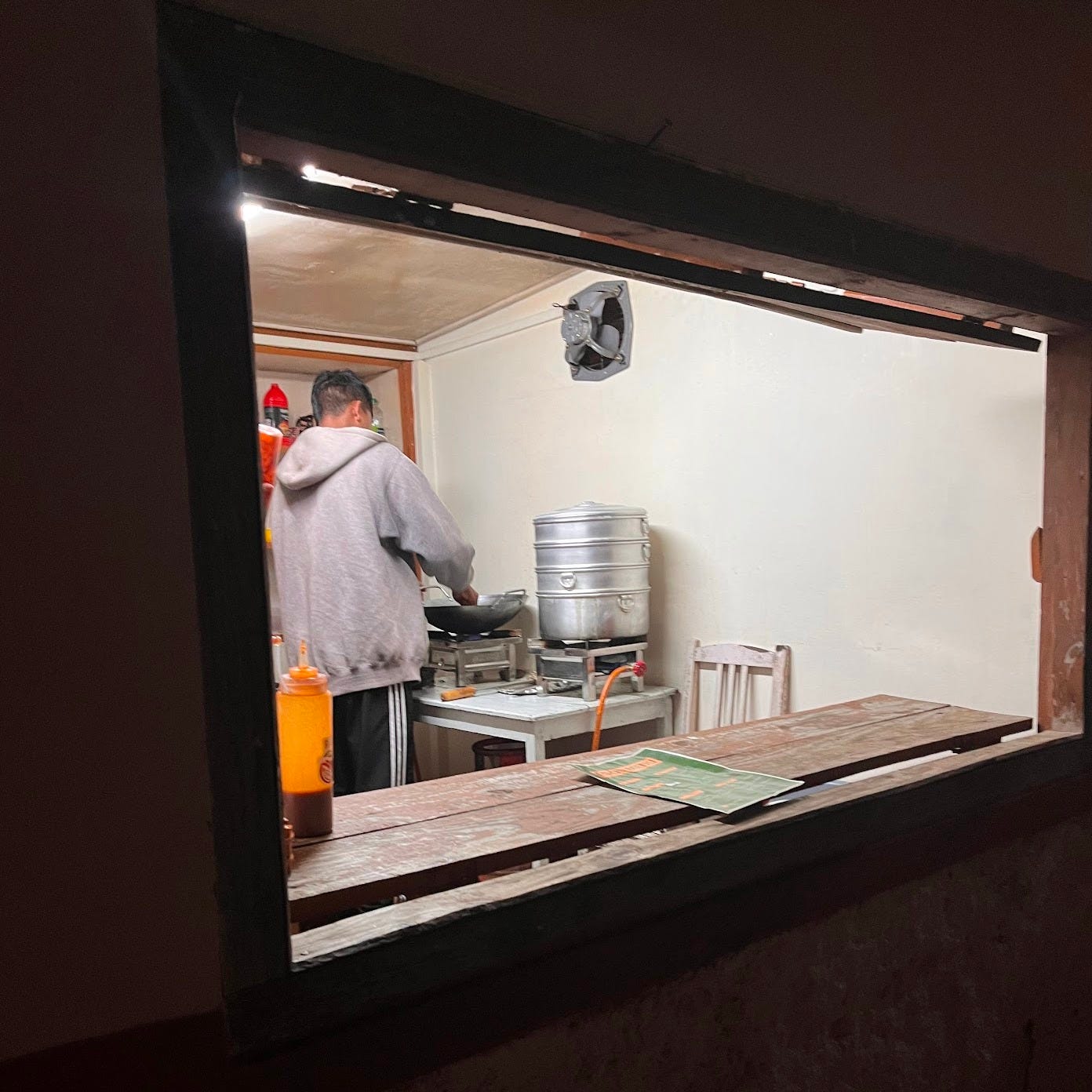
It is curious to observe that the word for anything can contain the whole range of experiences that surpass the word itself — sometimes even the polar opposite of what the word actually means in literal sense. Indeed, as I write of loneliness, I am drawn back to the first night in Shillong—a night of re-connection and belonging, highlighting this very capacity of an experience to hold its apparent opposite. Each one of us is home to such suspicious polarities. Joy and sorrow are always dancing together in our inner worlds.
After what felt like a lifetime of suffering, my husband and I found a perfect little window to stop fading behind the steely exteriors we so gracefully wore for everyone else. In the midst of Shillong’s God-bidden forests and star-abundant sky, we allowed ourselves to come undone. The night we arrived was still cushioned between grief and awe. It was our first trip together since baby Vinnie (our ginger cat) left the earthly realms to wreak havoc across the rainbow bridge.
Oh, how we adored that little devil! He would have loved the mountain air—lifting his snoot to catch its crispness. No doubt, he would’ve tried his luck befriending the owl that hooted from deep within the bamboo grove our neighbors had nurtured. The squared, tiled terrace garden would have made the perfect playpen to satisfy his boundless curiosity. But most importantly, he would have loved to chase his sister (our other baby Maya) away from the warmest spots in the room, for it was freezing out there in Shillong in January.
The fragility of existence in its infinite possibilities is already an isolating, if not sobering, experience. There is something elemental about being in this lonely raft of existence, rowing through the timeless tides of personal and collective history, memory, and experiences. Maria Popova names this elemental angst in her exploration of the human malaise of loneliness:
“Loneliness is the fundamental condition of life — we are born by another, but born alone; die around others (if we are lucky and loved), but die alone; we spend our lives islanded in our one and only human experience — in these particular bodies and minds and circumstances drawn from the cosmic lottery — amid the immense ocean of time and chance teeming with all possible experience.”
In the same essay, Popova delves into Jungian analyst Robert A. Johnson’s categorisation of loneliness into three categories — two of them time-bound, and the last one beyond the effigies of time. These distinct forms suggest how loneliness can stretch across the dimensions of our lives:
“the past-oriented loneliness of missing what once was and never again will be, the future-oriented loneliness of longing for what could be but has not come to pass, and what he calls ‘the profound loneliness of being close to God.’”
This sounds very similar to the First Noble Truth — Dukkha — that the Buddha insisted we look upon for the cessation of suffering.
“What the Buddha saw was that suffering is not the exception, but the rule. Not the interruption of life's party, but the music that always plays in the background. It's the itch behind pleasure, the hangover hiding behind the champagne,”
writes Elie, the creator behind The Mountain.
“Dukkha is not just in the heartbreak and funerals, it's in the perfectly lit family photos, in the promotions, in the weddings. Because every joy is hostage to impermanence”
Maybe the realm of loneliness, heartbreak, and sorrow is incumbent upon us and inevitable, hidden behind all facades of happiness. Maybe what we call chronic fatigue and depression colloquially, is in fact the body’s psychosomatic awakening to this deeper layer of existence — a curtain being drawn back from the illusion of eternalistic thinking. Perhaps opening to dukkha is like surrendering the rage we hold against the fire for burning us—and instead, recognizing that this is simply what fire does.
I will tell you more about Shillong’s history, culture, Khasi myths, and eco-theology, but not in this essay. Here, let me just take you into the experience of Shillong instead of the words that people often associate with it. The Upper Lumparing neighbourhood, where we boarded, was a quaint, picturesque, welcoming community — often reflective of Khasi hospitality. By the time we arrived, the sun was descending below the horizon; it wasn’t that late, but we were in the Easternmost part of the peninsula. Dusk arrives early here, and with it does the biting cold.
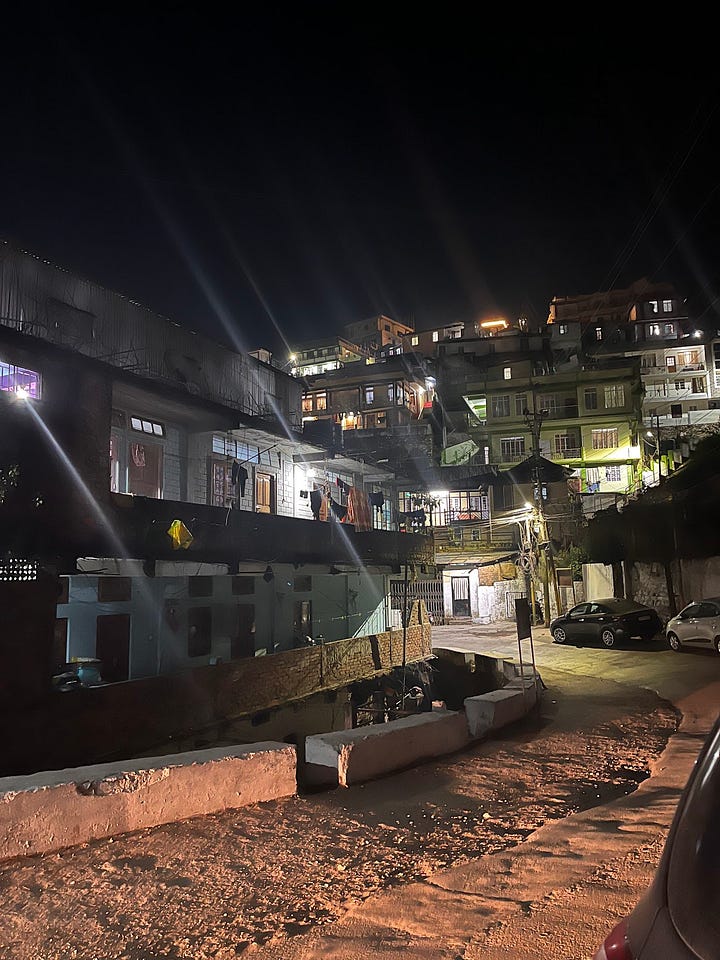
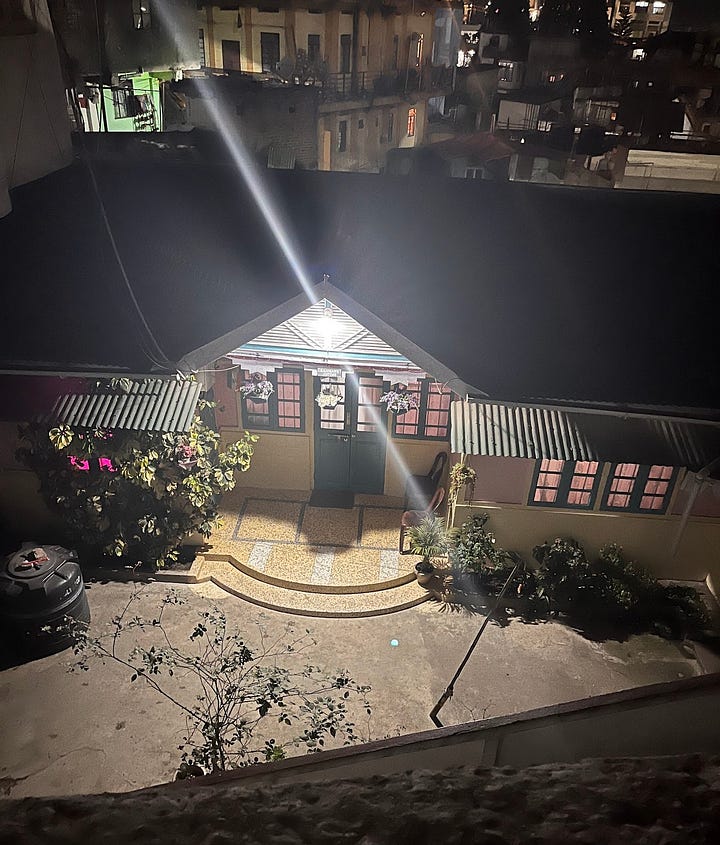
We hid ourselves beneath layers and decided to explore the neighbourhood, mostly in hunt for some traditional Khasi cuisine. The city cascades ever so sharply up and down, with sometimes steep, rough boulders cut and arranged as stairways — a couple of dozen steps both ways. There were cozy little homes on both sides of the public stairway, their gardens blooming with camellia, petunia, jasmine, varieties of orchids, and the majestic poinsettia. The night air serenaded us, and we floated down the stairways in a dreamlike haze.
The downtown market was mostly closed, with its old crooked walls forced into the shape of buildings — they stood in dazed bewilderment at our arrival. Right opposite the dilapidated quarters stood some towering old pines and oaks. Their leaves rustled in the silence of the night at the faint, ghostly passage of wind. Disturbed crows nestling within the canopies announced disapproval at our unwelcome arrival after dark near a forested land — dwelt by gods and beasts alike. There was no food to be found, but on our way back, we held hands while kicking dust off the road, laughing at our disappointment and hunger. Exhausted from our hike back, we stumbled upon a corner shop, right next door, whose hardworking owner made sure no one in her neighbourhood slept hungry. Sometimes the things we go so long searching for are right in front of us.
As I take you down this memory lane, let us stay here for a little longer. In this space between sorrow and hope, in this luminous loneliness of quiet awakening. I am yet to carry the spell of what I perceive as loneliness's essential, pliable nature and turn it into a chosen solitude of sacred creativity. I am yet to face the vast and bellowing wilderness of Khasi forests. For now, I am lingering here to study my inner polarities — between the part of me that is isolated at the reckless turning of the world and the one that goes hunting for solitude like a famished soul searches for food. I want to feel this delicious human affliction of curiosity, wonder, rejection, loneliness, and an instinctual need for silence. This derision of ego—so flammable in the quest for greater questions—offers no promise of better answers, only a fleeting dissolution into the visceral awareness of the ever-constant now.
Until then, there is just restless surrender to the elemental blithe and beauty, similar to what Rockwell Kent felt, one too many winters ago, in the wilderness of Newfoundland:
“The moon has risen and illuminates the mountain tops — but we and all our cove are still in the deep shadow of the night. It is most dramatic; the spruces about us deepen the shadow to black while above them the stone faces of the mountain glisten and the sky has the brightness of a kind of day.”
Berkana is a non-stripe based reader-supported publication. To support my work, consider becoming my patron through Paypal.



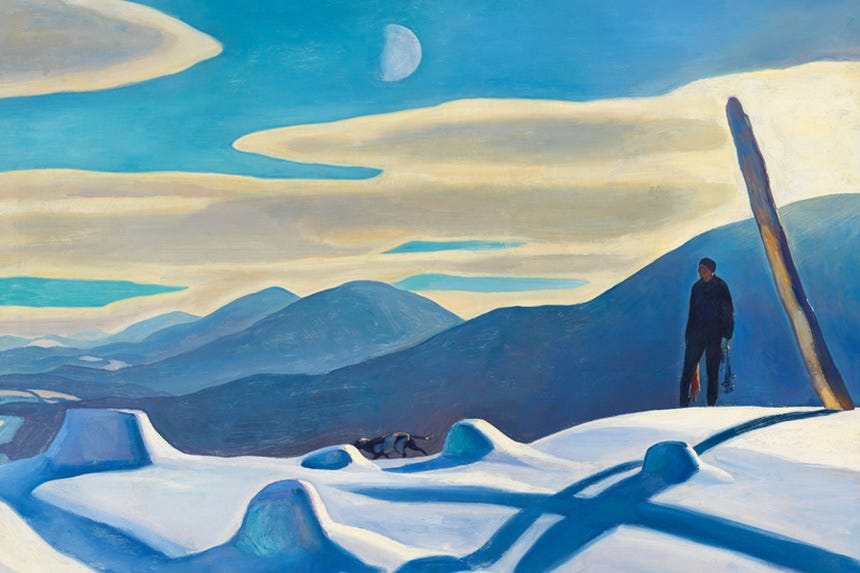
This captured the haunting beauty of our existential loneliness so well. Thank you ♥️
This was so beautifully written. it felt like i was there with you on your vacation. my deepest condolences for your loss ❤️🩹